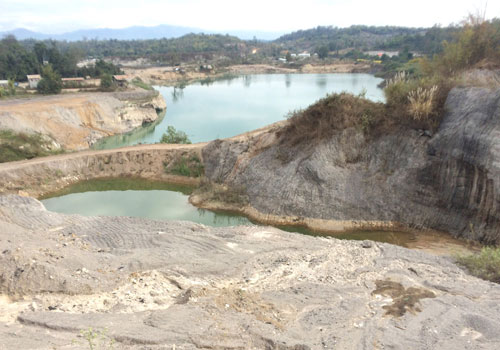Locals worried by huge cracks near coal mines in Thibaw Print By Si Thu Lwin and Kyi Kyi Sway | Tuesday, 04 July 2017
By Si Thu Lwin and Kyi Kyi Sway | Tuesday, 04 July 2017
People living in Nam Ma village tract in Thibaw township, northern Shan State, are worried about large cracks in the earth that opened up recently in the area where a coal mine has been operating since 2004.

A coal mine that has stopped operations is floaded with water. Photo - Supplied
On June 23, more than 600 people and 15 monks from more than 30 villages in Nam Ma held a ceremony to pray for the region’s environment. A day later, the coal mining company made an initial agreement with farmers to pay K150,000 in compensation for each acre of farmland damaged by the cracks, said U Kyaw Thein, Nam Ma’s administrative officer.
“We held a prayer ceremony to oppose plans to open another coal mine in the area that supplies drinking water for our village tract because of the cracks. These cracks are about 1000 feet long, 6 to 10 inches wide and 25 feet deep. It makes us worried, and they are dangerous for our children. Landslides occur almost every day. We want to suspend all coal mining,” U Kyaw Thein told The Myanmar Times on June 30.
“It has been a decade that nearly 2000 people from more than 400 households in Nam Ma village tract have suffered from these problems. We don’t want any more suffering, so we want the mining to stop,” said U Kyaw Thein.
There are seven villages in Nam Ma, and coal mines are operating in two of them – Nar Kon and Pan Khar. As digging underground goes on in Nar Kon, locals say they are worried about landslides and losing lives in the rainy season.

One of the cracks that occured recently due to coal mining. Photo - Supplied
It is very dangerous to extract coal by digging tunnels. We have seen these huge cracks that we have never seen before, as well as smoke. Polluted water from the mines flows into Nam Ma stream, which we rely on for water for drinking and washing. Now, the stream is polluted. The company said it will take responsibility, but we will suffer from the effects before they take action. Polluted water from the mines also affects farmland and crops,” Nan Law, information officer from the Shan State Farmers Network, said on June 29.
A mining site that stopped operations in 2015 at Pieng Hsai village has not been restored, she said, and the mining pit has filled with water, forming a pool and causing land to subside.
Coal mining was started in Pieng Hsai in 2004 by Ngwe Yi Pearl Company, and the mine tunnels extend about 300 feet underground.
“They built a fence around the pool, which has formed near a villager’s house, but the pool now extends far beyond the fence,” said Nan Law, who lives in Nam Ma village group.
“We are worried that the pool will swallow the house,” she said.
“I live in Wan Lone village. Now we are being asked to allow coal mining here in exchange for promises of electricity, roads, etc. But we will never agree to it,” said Nan Law.
The area the companies are interested in mining has been traditionally off limits for 100 years to conserve water for farming, according to Nan Law. Water is stored during the rainy season for use on farms when needed.
The pool left by the former coal mine in Pieng Hsai had been reported in the Pyithu Hluttaw last year by U Sai Thant Zin, who represents Thibaw township.
“I reported about the pool and other problems caused by coal mining in the area last year, but the minister didn’t give an answer, and the government seems uninterested,” said U Sai Thant Zin.
“However, we plan to survey the coal mining area after the current Pyithu Hluttaw session has finished. I am in contact with the villagers about it,” he said.
Translation by Win Thaw Tar
Voting power နည္းေန႔ဘ႐ိုေရ 😁
done sir